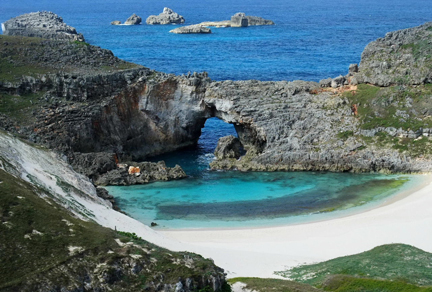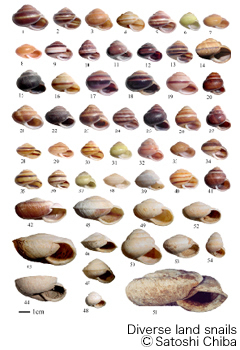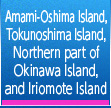- Ministry of the Environment>Nature & Parks>
- World Natural Heritage in Japan>
- Ogasawara Islands>
- Outstanding Universal Value
Outstanding Universal Value

- Remarkably high rate of endemic species and ongoing evolutionary process on the oceanic islands*
*Oceanic islands: Islands that have never been connected to a continent
A Treasure Trove of Endemic Species
The Ogasawara Islands are located about 1,000 km away from
Tokyo to the south. They consist of islands that are surrounded by
vertical cliffs and ocean whose beautiful color is referred to as "Bonin
Blue".
Since the islands have never bordered a continent in their history,
the wildlife species found in Ogasawara are the descendents of
animals and plants that arrived there by chance. Some were carried
by birds or the wind, while others were washed up by ocean
currents or clung to driftwood. Those species have survived by
adapting themselves to the environment of the islands. They then
became established on the islands and evolved in their own unique
ways in a long period of time within an environment far separated
from the mainland. As a result, this led to the occurrence of many
endemic species which are not to be seen anywhere else, such as
Melastoma tetramerum and Hemicordulia ogasawarensis. Roughly
40% of the vascular plants, about 25% of the insects, and more
than 90% of the land snails (roughly 100 species) are endemic to
Ogasawara.

Ongoing Evolutionary Process
The evolutionary process on the Ogasawara Islands is presently
ongoing. The land snails and plants in particular have repeatedly
undergone speciation by changing their morphology in accordance
with their environment. This type of evolutionary process is called
"adaptive radiation."
What is more, important examples that suggest mechanisms
whereby species adapting from the ocean to the land can also be
observed. As an example, Stenomelania boninensis is thought to
have expanded their habitats in coastal to brackish water and then
on to purely freshwater environments.








